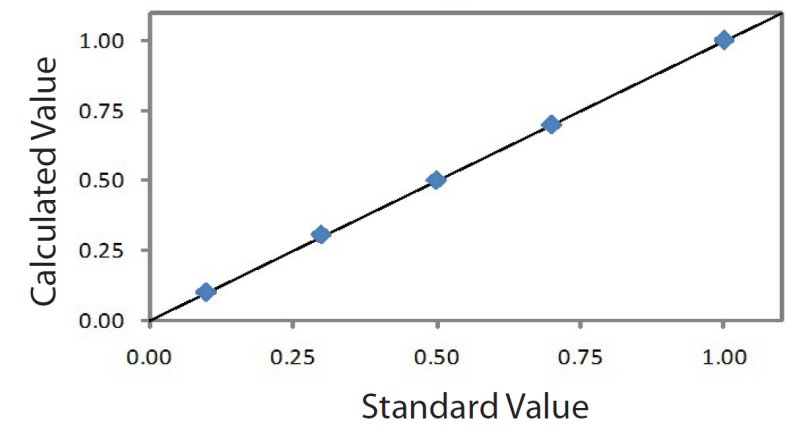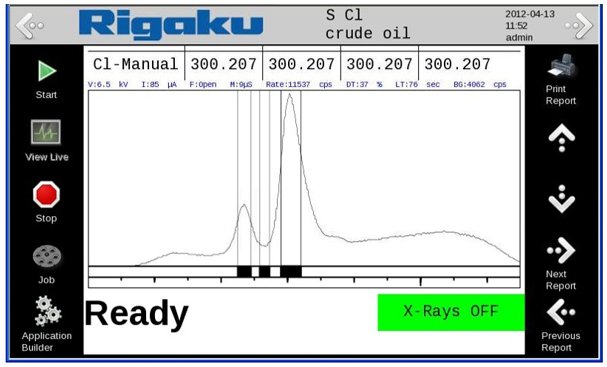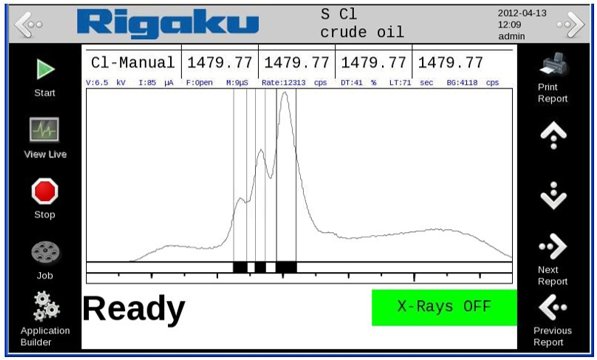Sulfur in Crude

Scope
The analysis of sulfur in crude oil as per ASTM D4294 is demonstrated. The performance shown is applicable to:
- light and heavy crude oils
- residual oil
- bunker fuels
Background
Sulfur will always be an important element in crude oils and fuel oils. Sulfur content is regulated in many products and plays an important role in fuel quality and control of polluting emissions. Around the world, regulations limit the amount of sulfur allowable in diesel fuels, kerosene, heating oils, etc., thus affecting the price and quality of crude oil based on sulfur content of the crude. Reliably characterizing the sulfur content of crudes ensures proper quality for the various feedstocks at the refinery and optimum blending ratios when blending different crudes to meet the desired sulfur concentration. Monitoring sulfur is also critical when characterizing other similar oils, like residual oils and bunker fuels. To meet the needs of the industry, Rigaku offers NEX QC, a simple and versatile benchtop EDXRF analyzer for the analysis of sulfur and other elements in crude oil, petroleum oils, and fuels.
_picture_2020.06.25.jpg?width=800&height=610&name=800x610%20NEX%20QC%2B%20(S%20in%20Crude%20screen)_picture_2020.06.25.jpg) Model: NEX QC
Model: NEX QC
Low range: 0.1 – 1.0% sulfur
Calibration
An empirical calibration was built using a set of commercially available certified crude oil standards. A summary of the calibration for 0.1 – 1.0 S is shown here.
| Element: S Units: % |
||
| Sample I.D. | Standard value | Calculated value |
| STD 1 | 0.10 | 0.098 |
| STD 2 | 0.30 | 0.304 |
| STD 3 | 0.50 | 0.499 |
| STD 4 | 0.70 | 0.698 |
| STD 5 | 1.00 | 1.001 |
 Correlation plot S
Correlation plot S
Repeatability
To demonstrate repeatability (precision), the select samples were chosen from the set of calibration standards. Each sample was measured in static position with typical results shown below.
| Element: S Units: % |
||||
| Sample I.D. | Standard value | Average value | Std. dev | % Relative |
| STD 1 | 0.10 | 0.0994 | 0.001 | 1.0 |
| STD 3 | 0.50 | 0.5035 | 0.003 | 0.6 |
High range: 0.5 – 5.0% sulfur
Calibration
An empirical calibration was built using a set of commercially available certified crude oil standards. A summary of the calibration for 0.5 – 5.0 S is shown here.
| Element: S Units: % |
||
| Sample I.D. | Standard value | Calculated value |
| STD 6 | 0.50 | 0.505 |
| STD 7 | 1.00 | 0.994 |
| STD 8 | 2.50 | 2.488 |
| STD 9 | 3.00 | 3.011 |
| STD 10 | 4.00 | 4.015 |
| STD 11 | 5.00 | 4.988 |
.jpg?width=1104&height=655&name=EDXRF1149%20Correlation%20plot%20S%20(high).jpg)
Correlation plot S
Repeatability
To demonstrate repeatability (precision), the select samples were chosen from the set of calibration standards. Each sample was measured in static position with typical results shown below.
| Element: S Units: % |
||||
| Sample I.D. | Standard value | Average value | Std. dev | % Relative |
| STD 7 | 1.00 | 0.993 | 0.004 | 0.4 |
| STD 11 | 5.00 | 5.006 | 0.015 | 0.3 |
Multi-element versatility
The NEX QC is capable of measuring more than just sulfur. Multi-element analysis is important for detecting crude oil contamination or adulteration by the presence of salt and other chlorine-bearing compounds. Left undetected, the presence of Cl can bias the S reading high and potentially leave the presence of Cl unnoticed. NEX QC can detect Cl and other elements and correct for the presence of Cl so that its presence is noticed and does not bias the S reading.

Sweet crude 0.5% S containing no Cl

Sweet crude oil contaminated with Cl
If unnoticed and uncorrected, the Cl will bias the sulfur reading high
International standard test methods
The Rigaku NEX QC complies with the following international standards and test methods for measuring sulfur in crude and petroleum oils. Note that by weight 1 ppm = 1 mg/kg.
| ASTM D4294 | ISO 20847 | ISO 8754 | IP 496 | IP 336 | JIS K 2541-4 |
| 16 ppm - 5% | 30 - 500 mg/kg | 100 mg/kg - 5% | 100 mg/kg - 5% | 100 mg/kg - 5% | 0.01 - 5% |
Conclusion
The performance shown here demonstrates the ability of the NEX QC to yield excellent results for the measurement of crude oil and other heavy petroleum oils. A simple, modern touchscreen interface allows for reliable and efficient measurement protocols, and performance meets the major international norms shown above.

Contact Us
Whether you're interested in getting a quote, want a demo, need technical support, or simply have a question, we're here to help.
